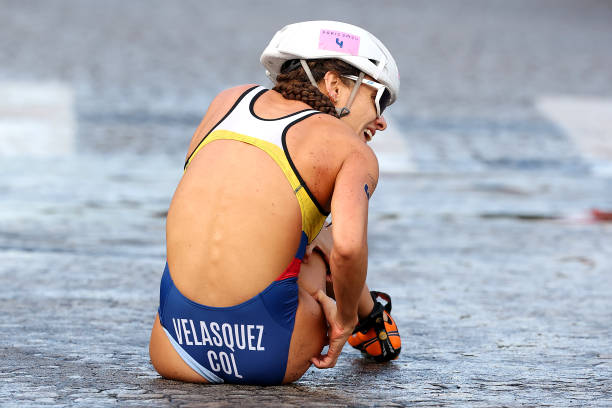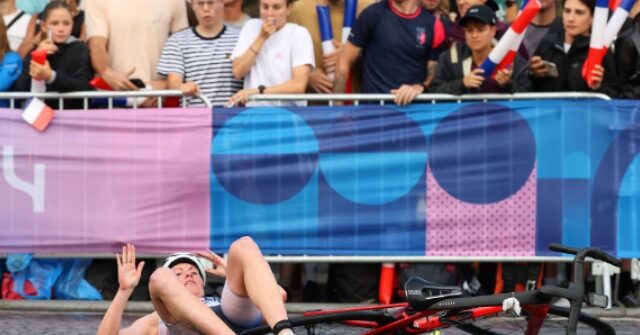The heavy rainfall in Paris is not only wrecking scheduling and travel; it also made the cycling portion of Wednesday’s women’s triathlon more reminiscent of a demolition derby.
The combination of extreme heat and near-constant rainfall sent out-of-control riders crashing to the ground, leaving some needing medical attention.
Guam’s Manami Iijima, Brazil’s Vittoria Lopes, Germany’s Lisa Tertsch, and Belgium’s Jolien Vermeylen all hit the ground hard.
Swimming 2.4 miles in open water, sprinting to a bike, biking 3 miles and then this happens to you. Tough day at the office for Guam’s Manami Iijima pic.twitter.com/GdfpdzUmwm
— Sickos Committee (@SickosCommittee) July 31, 2024
Vittória Lopes saiu em terceiro da natação no triatlo e estava no pelotão quando caiu da bicicleta. Fazia grande prova a brasileira. Uma pena. Muitos tombos na prova até aqui na bicicleta. pic.twitter.com/Tg702WtW1T
— Gustavo Garcia (@garciaggust) July 31, 2024
“I don’t really have any words for the last two hours that we just experienced,” said Australian triathlete Sophie Linn. “That was every single possible adverse weather condition, you know, a high current, rain, heat, humidity like it was just everything and the crowds.”

Maria Carolina Velasquez Soto of Team Colombia is seen after a fall during the Women’s Individual Triathlon on day five of the Olympic Games Paris 2024 at Pont Alexandre III on July 31, 2024, in Paris, France. (Lars Baron/Getty Images)
At least one competitor quit the race rather than deal with the treacherous conditions. Norwegian athlete Lotte Miller gave up her bid for victory after multiple crashes.
Organizers spent $1.4 billion cleaning the Seine River in preparation for the Olympic competition. However, the constant rain, a fairly predictable thing for Paris in July, churned up enough pollution that the race was postponed. Fearing the impact further delays would have, the decision was made to go forward with the race. However, the Seine was not the only portion of the triathlon impacted by rain.
“It was like it was a really weird video game I just played,” said Australia’s Sophie Linn. “I think we got more dirty on the bike [than in the water], to be honest, from all the water coming up off the road. I tried to really ensure that the position within the pack was always near the front to avoid any crashes.”







